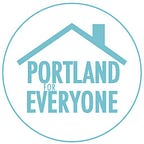Cottage clusters: Portland’s chance to build community in a new way
Oddly, the city has proposed not to encourage a popular concept: handfuls of cottages that surround a common yard
by Michael Andersen | Nov. 2, 2017
First in a series about ways to help Portland’s latest residential infill project proposal house more people more cheaply. The comment deadline is Nov. 20.
When Portland unveiled the “discussion draft” of its proposed residential infill code last month, one of the surprises was something the code didn’t include.
It didn’t include a meaningful path to one of the “missing middle” housing types that seems to generate the most oohs and ahhs from many Portlanders: the cottage cluster.
The basic idea of “cottage zoning” is simple: on a relatively larger tract of land (for example, 10,000 square feet) where someone would ordinarily be able to build a few bigger homes (say, two 2,450-square-foot homes, each with an 800-square-foot accessory unit) the city gives them the option to build more small buildings that add up to the same size (six 1,080-square-foot homes, for example, or six 1,000-square-foot homes and one shared 500-square foot dining and kitchen area).
Cities often require cottages to face a common yard or to have design elements like deep porches that create a sense of shared semi-public space for the small community.
This elbow-rubbing lifestyle isn’t everyone’s cup of tea, of course. But for many people — seniors who want community, working parents who want to share child-care, anyone who wants to save money by living in a smaller house — cottage clusters create a way of living that Portland’s huge grid of freestanding homes rarely offers today.
Because cottages are often built to one story only, they’re particularly suited to people with mobility challenges or seniors who don’t want their future mobility challenges to force them out of their homes.
So why hasn’t Portland proposed a cottage code?
City planner: We’re already “75 percent of the way there,” but details would get complicated
Officially, the new “discussion draft” of the city’s proposed residential infill code does include cottage clusters. But it’s not a complete policy: it doesn’t offer the option to build more homes or to distribute their sizes differently — only to arrange them in a different pattern.
On a hypothetical 10,000 square foot lot, six 1,080-square-foot homes wouldn’t be an option; the code would only allow two homes up to 2,450 square feet plus two of up to 800 square feet. And there’s no extra allowance for shifting some of that into, for example, a community room or craft space available to all residents, like at Portland’s existing Cully Grove:
If some residents wanted to own their homes, they’d have to be sold as condominiums, making the whole project harder to finance than a standard subdivision.
The city also proposes no incentive to price some of the homes in a cottage cluster below market rate, or to make them universally accessible.
Essentially, the only advantage of choosing a cottage cluster rather than a standard subdivision would be to get more flexibility on how to arrange the structures and their parking spaces.
Morgan Tracy, the city’s lead planner of the infill code, acknowledged that the city’s current proposal is only about “75 percent of the way” to a true cottage option. And he said it’s clear that many Portlanders say they’d like to live in cottage communities.
“There’s a high interest; it’s a great idea, lovely,” he said. “I want to live in one. But the actual incidence of people doing it is very low.”
Without more indication that the projects will ever be common, Tracy said, it didn’t seem worth coming up with a new regulatory system just for cottages.
“Maybe there’s more work to be done on it, but we didn’t want to spend a disproportionate amount of time trying to flesh out what’s essentially another project within this project,” he said.
Bend homebuilder: More homes per acre is key to cutting home prices
Tracy Thompson, owner of Tyee Development in Bend and builder of the recently built NW Crossing cottage cluster there, said in an interview Tuesday that he would have liked to build and sell the homes in that project for lower prices, but because his project ended up at about the same density as any other newly built subdivision, the homes came out to about the same price too.
“We ended up just building a product where there is a demand, but it certainly isn’t affordable housing, that’s for sure,” Thompson said.
Thompson said he thinks cottages are a niche market, but one that a segment of the population would be eager to live in if they were able to.
“I think what people like about it is people are looking for less home and maintenance,” Thompson said. “They still have their own house; they just don’t need the big yard or the big house.”
Also, Thompson said, arranging some of the homes to face one another can just feel friendlier than a standard subdivision.
“They’re all kind of looking at each other and keeping an eye on each other and they kind of develop a little community, at least in ours,” he said. “And people like that.”
If you think Portland’s residential infill project should (or shouldn’t) include a full cottage zoning option, you can email comments to residential.infill@portlandoregon.gov. The deadline is Nov. 20.
Portland for Everyone supports abundant, diverse, affordable housing. This blog is a reported effort on how to get more of those things. You can learn how to influence the residential infill project here.
